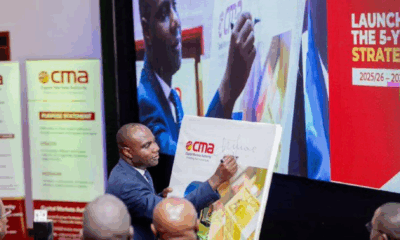Ramathan Ggoobi
Was 2014/15 a crisis budget?
Why are matters of the economy not left to economists; just like military matters were left to Generals?
Early this week, Mr. President (such as reappointing the former Chief Justice Benjamin Odoki to an illegal third term and refusing to appoint another CJ when Odoki was rejected), but by and large it is trying to fulfill its mandate.
Turning to the economy, you will find that economic matters in this country are now decided on by mainly non-economists. You politicians have turned yourselves into expert economists. You often come up with economic policies and decisions without proper analysis of their economic viability, whether they are Pareto-efficient and Pareto-improving. The recent budget is one example that seems not to have been subjected to professional scrutiny by economists.
Mr. President, the economists found a number of contradictions in the budget that left them wondering whether their colleagues at Ministry of Finance, Planning and Economic Development (MoFPED) had any input in this “NRM Caucus” paper.
Take the example of the taxes that were proposed by the Minister to raise the revenue to finance the various “priority expenditures”. Most of the new tax proposals are regressive and likely to defeat the intentions of the budget.
Why tax hoes?
For instance, the Minister clearly states in the budget that “agriculture and agribusiness is a priority to Government to create jobs, improve productivity and expand exports in the medium term.” However, when it comes to taxation, the Minister imposed taxes on nearly all agriculture inputs. She terminated exemptions on feeds for poultry and livestock, packaging materials to the diary and milling industries, specialized vehicles, plant and machinery services.
Yet research shows that use of agriculture productivity enhancing inputs remains very low in the country. For example, only 7% of our farmers use fertilizers; and about 24% use improved seed. Mr. President, by imposing taxes on inputs, your government is as if asking the few farmers that use modern inputs to stop, yet we always hear you saying you are committed to modernizing and commercializing agriculture.
The Minister also terminated the exemption on interest income on agricultural loans, yet recent research by FinScope (an international agency that carries out financial surveys) shows that only 10% of Ugandans borrow for agricultural production. This tax is likely to reduce the demand for agricultural loans even further, despite the fact that agricultural financing is one of the main obstacles to agricultural development in Uganda.
Altogether, Government hopes to raise about Shs.200 billion from taxes on agriculture. How much did the Minister allocate to the sector? About Shs. 450 billion. This means that she actually gave agriculture only 250 billion, since the other Shs.200 billion will be taxed away from the sector. The sector is often accused of possessing very low absorption capacity — that it cannot absorb even the “little” money it is allocated. The economists attributed this to poor prioritization within the sector. A lot of money was being allocated to extension services, yet farmers need inputs such as seed, machines, fertilizers, irrigation units, and processing plants.
The Minister also identifies tourism as a priority sector that will significantly contribute to national output. She however, “boosts” the sector by imposing a tax on hotel accommodation in tourist lodges and hotels outside Kampala District!
Tax on salt! In 21st Century?!
Apart from taxes on productive sectors, you also imposed some regressive taxes on the poor and the vulnerable groups. During our discussion at Serena, the Economic Policy Research Centre (EPRC) presented a scientific study on the tax incidence in Uganda, and how the 2014/15 budget proposals might affect the people of Uganda.
They confirmed what commonsense would suggest; that the reinstatement of VAT on salt and paraffin is likely to be highly regressive. That is to say, the poorer households will pay a disproportionately bigger share of the tax than the wealthier households, relative to their incomes. Therefore, these two taxes will make the poor poorer and the rich richer, thereby widening the already massive gap between the two groups.
Mr. President, although economists appreciated the fact that Government must raise revenue through taxation to finance its expenditures, Government seems to be desperate and fidgeting by imposing taxes on activities that would support production to boost growth of the economy, create jobs, and enable it to achieve its stated goals. There still so many activities and individuals that should be taxed but were overlooked by Government.
The same study by EPRC also found that taxes on sugar and fuel (both petrol and diesel) were good, since the incidence was found to be borne mainly by the wealthier or the well-to-do groups than by the poor.
Instead of taxing salt, why don’t you increase the levies on alcohol, cigarettes, idle properties such as land and buildings, and incomes of capitalists that NRM has bled in hordes? Mr. President, instead of imposing taxes on hoes, why don’t you rein in on your powerful politicians and army generals that evade taxes and as well protect other businessmen from paying tax?
Self-inflicted crisis
Instead of taxing vendors of roasted maize and plantain, why don’t you lock up your thieves that continue to steal the “little” tax revenue that Ugandans pay, so that it can be put to proper use? Instead of borrowing from banks to finance the ever growing budget, which is likely to crowd out private investment and hamper the effectiveness of monetary policy instruments, why don’t you cut the size of government? What will Uganda lose if the size of Parliament, cabinet, presidential advisors, number of districts and RDCs was trimmed? What happened to fiscal discipline?
Mr. President, instead of drawing our savings, now at the tune of Shs.3.6 trillion, to finance the NRM Caucus to go around the country to ‘decampaign’ Amama Mbabazi, why don’t reflect and realise that every good thing has a life span and perhaps it’s time you took a rest and let your comrades carry the struggle forward?
Mr. President, the reason we have reached where we are now — taxing hoes, seeds, fertilizers, salt, paraffin, widows vending food and vegetables — is mainly because we are in a crisis. This crisis was not accidental. It is a self-inflicted crisis that was created by your irrational determination to hold power beyond your shelf life. It is a crisis that was created when you failed to realise that failure of governance leads to failure of economics.
This crisis came as a result of a number of mistakes that you committed in the bid to retain power at all costs. You were forced to sign some draconian laws that I am sure you wouldn’t sign if you were still legitimate. Our country is now isolated; we no longer receive official development assistance (ODA) that undoubtedly we still need. I heard you celebrating that since now we are going to domestically finance the budget at a tune of 82%, we are independent. The question should be; was this our own choice or a reactive move? Are the domestically generated resources that we hope to raise efficiently raised? Of course we shall survive under the circumstances, but at what cost? And is this cost inevitable?
Expert analyses have already shown us that although government tried to allocate money to some priority activities that this economy badly needs — roads, electricity, security, agriculture, tourism, education, and health — the ways through which it hopes to raise the money to finance them are regressive and inefficient, with the possibility of crowding out private investments and affect growth of the economy. This is why we emphasised as economists that let matters of the economy be left to economists; just as military matters were left to Generals!
Comments


























